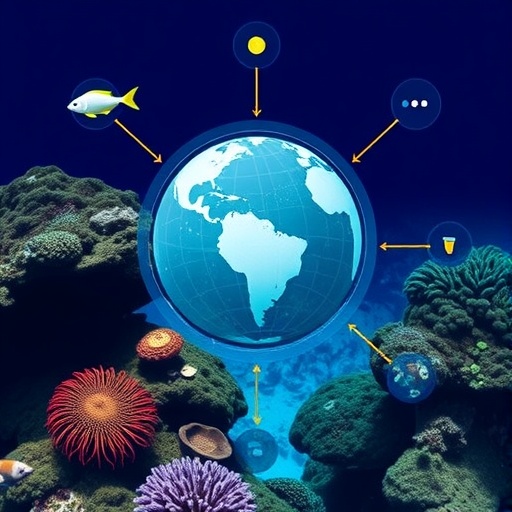Beneath the crystal-clear waters surrounding the Okinawa archipelago, a vital yet often overlooked world is quietly thriving. The reef-building corals of the order Scleractinia, with their rigid calcium carbonate skeletons, have shaped and sustained some of the most biodiverse marine ecosystems on the planet for centuries. Traditionally, studying these intricate coral communities involved labor-intensive in-water surveys conducted by divers, a method that is both logistically challenging and inherently limited in scale. However, a groundbreaking study published in Galaxea Journal of Coral Reef Studies has introduced a revolutionary environmental DNA (eDNA) metabarcoding system that promises to transform coral reef monitoring with unprecedented precision and efficiency.
For decades, marine biologists and ecologists have relied largely on direct visual identification of corals, which requires trained divers to meticulously catalogue species present in discrete reef patches. These traditional survey methods are constrained by depth, visibility, and diver endurance, rendering expansive monitoring across the vast stretches of reef ecosystems impractical. Moreover, morphological similarities within coral species complicate accurate identification, sometimes leading to erroneous assessments of coral diversity. Professor Nori Satoh of the Okinawa Institute of Science and Technology (OIST) Marine Genomics Unit, co-author of the study, highlights the limitations: “Surveys usually cover only tens of meters, but reefs span kilometers—making comprehensive assessments virtually impossible by conventional means.”
The advent of environmental DNA technology has ushered in a new era for biodiversity assessment. All living organisms constantly shed genetic material—through mucus, skin cells, and waste products—into their surrounding environment. In marine ecosystems, this DNA disperses within seawater, providing a molecular fingerprint of the organisms inhabiting a particular locale. The research team leveraged this property to develop the Scleractinian Environmental DNA Metabarcoding system (Scl-eDNA-M), a tool capable of detecting nearly all known genera of reef-building corals in Japanese waters by analyzing seawater samples without direct interaction with coral colonies.
Prior eDNA-based coral detection efforts were hampered by incomplete reference genome databases, limiting the ability to confidently assign DNA sequences to coral genera. Existing international mitochondrial genome libraries covered data for roughly 60 of the 85 known Scleractinia genera in Japanese waters, leaving a significant portion undetectable. Addressing this gap, the researchers undertook a comprehensive sequencing project, successfully capturing mitochondrial genome sequences for nearly two-thirds of Japan’s coral genera. This enriched reference allowed for dramatic improvements in identification accuracy and coverage.
By applying the Scl-eDNA-M system to samples collected throughout the Ryukyu Archipelago—including Okinawa’s main and outlying islands such as Kerama, Miyako, and Kumejima—the team unveiled an unexpectedly rich coral diversity. At least 70 coral genera were detected in the area, many of which had been overlooked or underrepresented in previous surveys. These revelations underscore the ecological significance of Okinawa’s reefs and hint at a broader, previously unappreciated complexity in coral distributions across the Pacific.
Such fine-scale resolution in detecting coral diversity has profound implications for conservation. Coral reefs, which cover just 0.2% of the world’s oceans, sustain over 30% of all marine species and provide crucial benefits including shoreline protection, fisheries support, and carbon sequestration. Their health and longevity are paramount to oceanic ecosystems and human societies alike. Yet climate-driven stressors such as rising seawater temperatures have led to recurrent mass bleaching events, causing substantial coral mortality worldwide. Effective conservation strategies hinge on the ability to perform frequent, large-scale monitoring of reef assemblages, a feat now achievable through eDNA metabarcoding.
Prof. Satoh emphasizes the broader environmental context, noting that coral colonies have recently been discovered as far north as the entrance to Tokyo Bay—a trend attributed to shifting ocean temperatures and climate change impacts. This latitudinal expansion represents both an opportunity and a challenge for marine scientists seeking to track ecosystem responses to environmental shifts. The Scl-eDNA-M system offers a scalable, non-invasive solution to monitor such changes continuously, enabling researchers to anticipate and respond to evolving coral reef dynamics.
Looking beyond Japan, the research team plans to validate this eDNA approach in biodiversity hotspots across the Pacific, including Palau and Taiwan, with ambitions to extend studies to Hawaii as well. By standardizing coral DNA monitoring across multiple geographic regions, scientists hope to create a global framework capable of guiding reef restoration and protection initiatives. This initiative represents a broader shift within marine sciences towards integrating molecular tools with traditional ecological methods for enhanced ecosystem management.
This advancement aligns with the growing recognition that precision in biodiversity assessments is critical in the era of rapid environmental change. Environmental DNA metabarcoding leverages high-throughput sequencing technologies and robust bioinformatics pipelines to deliver rapid, cost-effective species detection with minimal disturbance to sensitive habitats. In coral reef ecosystems, where physical surveys are historically fraught with challenges, the introduction of such molecular methodologies marks a pivotal step toward real-time, large-scale ecological monitoring.
The multidisciplinary collaboration behind this study—encompassing institutions such as OIST, University of the Ryukyus, University of Tokyo, Miyazaki University, and Kyushu University—reflects the complex scientific effort required to develop and validate novel conservation tools. Supported by the Japan Science and Technology Agency (JST) COI-NEXT program and regional innovation grants, this project exemplifies how investment in cutting-edge marine genomics can yield actionable insights to protect fragile marine habitats globally.
Ultimately, the Scl-eDNA-M system does more than catalog coral diversity: it equips conservationists and policymakers with the ability to track reef health, detect early signs of ecosystem distress, and prioritize areas for intervention. In a world where coral reefs face unprecedented threats, harnessing the power of environmental DNA offers hope for sustaining these vital ecosystems for generations to come.
Subject of Research: Animals
Article Title: (Not explicitly provided in content)
News Publication Date: 22-May-2025
References: Galaxea Journal of Coral Reef Studies
Image Credits: (Not provided)
Keywords: Oceanography




